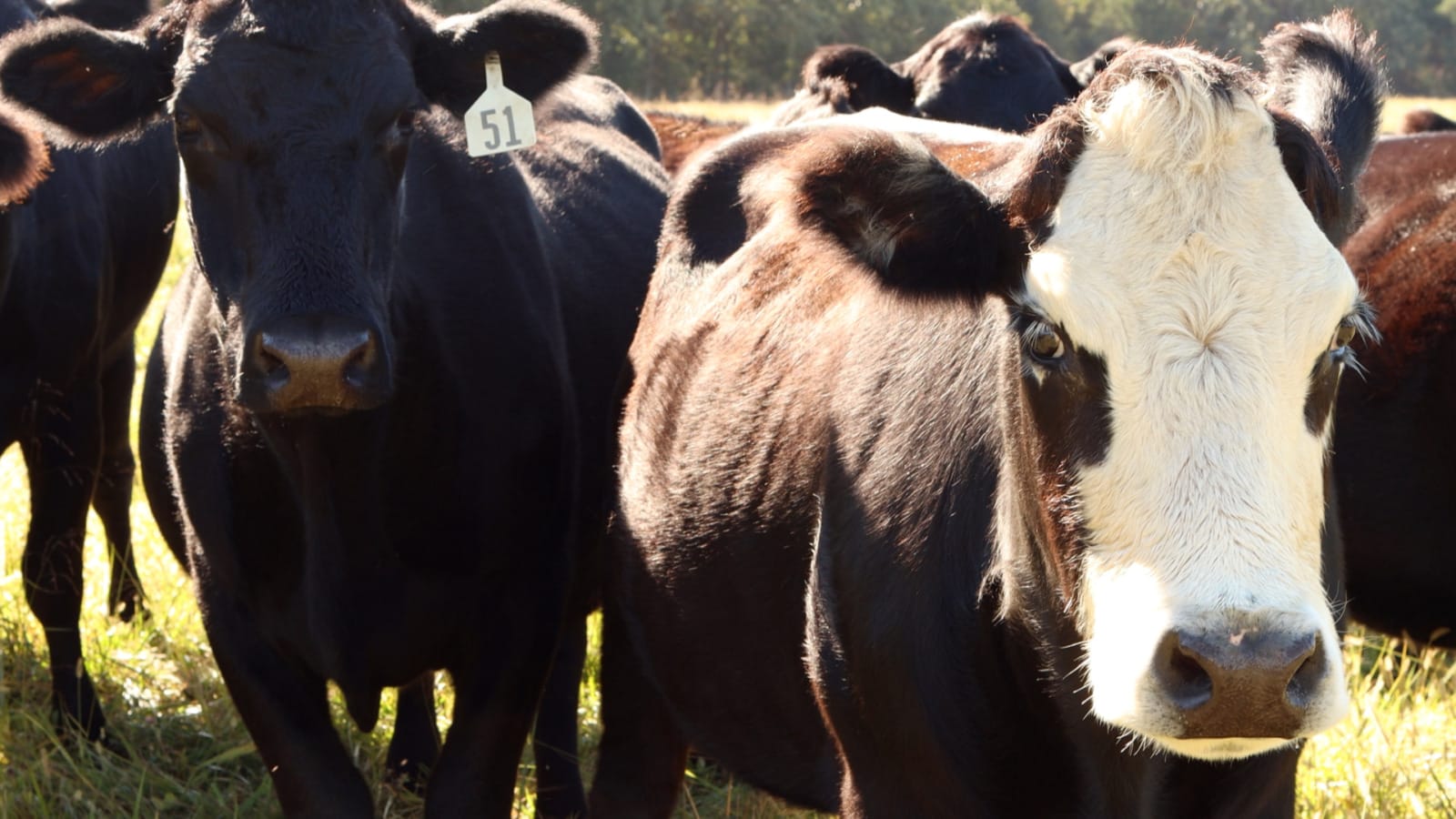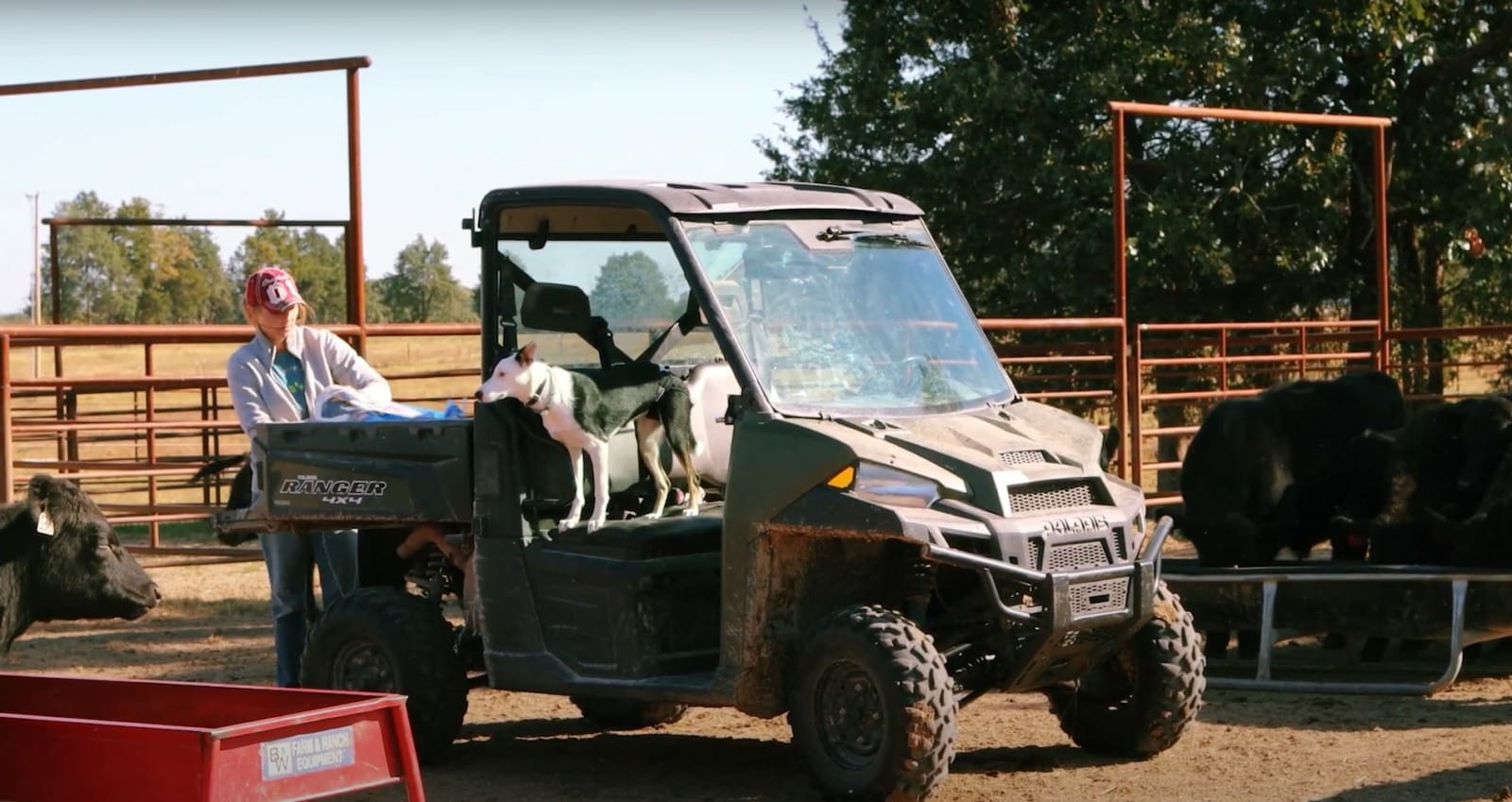AgrAbility Helps Folks of All Abilities to Farm One Step at a Time
Published November 29th, 2023 at 6:00 AM
Above image credit: Carey Portell is a full time cattle farmer, who also speaks about distracted driving, farming with disabilities and mental health. (Cami Koons | Flatland)CUBA, Missouri — Carey Portell slid into the seat of her utility vehicle and waited briefly for Kimber, her border collie farm dog, to hop up beside her.
She pulled along a cattle trough, stepped out to empty a feed bag for hungry cows, and climbed back into the idling vehicle to drive up to the next trough and repeat the process.
This is the carefully calculated way Portell cares for her cattle without overexerting herself. As a part-time wheelchair user, she can take about 1,800 steps each day, and she needs to take those steps to maintain mobility.
“It’s very exciting to be able to get up and do my cattle farming, even though it can be hard work,” Portell said. “I try to plan the rest of the day around that.”
Cattle farming was always a passion of Portell’s. But it didn’t take center stage in her professional life until she was hit by a drunk driver nearly 12 years ago and sustained life-altering injuries.
Four years and about a dozen surgeries later, Portell adjusted to her new reality. She didn’t want to go back to her former careers as a photographer and an X-ray technician. So, the cattle farm she and her husband ran in the background became her focus.
Her persistence, willingness to adapt and support from Missouri AgrAbility allowed Portell to expand her cattle farm into a successful business.
Flatland on YouTube
Portell’s success is just one of many for Missouri AgrAbility, which works with producers of varying abilities and types of agriculture operations in the state.
Karen Funkenbusch, the project director for Missouri AgrAbility, said the organization performs around 50 on-farm assessments each year. Like Portell, these producers have a dream of working in agriculture, but need some help in outfitting their operation to better fit their abilities.
“We’re going to educate them on that journey. We’re going to educate them about their disability. We’re going to educate them about services,” Funkenbusch said.
AgrAbility is a national program funded by the U.S. Department of Agriculture since its introduction as part of the Farm Bill in 1990. Each state has its own branch, which is tied to a land-grant university and a disability-related nonprofit.
In Missouri, the program is a partner of the University of Missouri Extension, Lincoln University and the Brain Injury Association of Missouri. Funkenbusch said the program makes a point to work with socially disadvantaged, limited resource and smaller farmers, in addition to more traditional, large operation farmers and ranchers.
“We’re a real complement to each other,” Funkenbusch said.

The program also works with other associations around the state, including the Missouri Cattlemen, Missouri Department of Agriculture, and the state departments of labor, mental health and education.
“When we do that intake at the very beginning, we want to know not only about their disability, we want to learn more also about their agriculture, we want to learn about their dreams, we want to learn about their aspirations, we want to learn about their support system,” Funkenbusch explained.
AgrAbility is just one part of a farmer’s success, Funkenbusch said. It’s vital to collaborate with and educate their support system, their doctors and their communities.
“Anybody and everybody that our farmers are going to work with, we continue to provide the structure and the guidance that they’re going to need,” Funkenbusch said.
Some of that education is super simple — like for Portell, being instructed on how to climb in and out of her tractor properly to prevent a fall.
“They’re so obvious, but when you’re a normal bodied person, you just do whatever is convenient and works for you. You don’t think about all of those safety things we should be paying attention to,” Portell said.
AgrAbility also helped Portell with other areas of her recovery.
The mental health implications of her injuries and of surviving a fatal car crash were every bit as difficult as her physical recovery.
“I cannot tell you how much mental health has attributed to my success in being where I’m at today and continuing to walk and live at the level that I would like,” Portell said.
Now she works as a spokesperson with AgriSafe to talk about mental health in the agricultural sector.
Studies have found that mental health conditions (such as anxiety and depression) are consistently higher among farming populations than the general population. This is due largely to the unique stressors in the industry, such as the dependency on the weather, obligation to produce and the variability of the market.
“It’s so much mental stress, and then when you have an injury, or you start to age… for a lot of these farmers, that is their identity … and whenever that is threatened, they’re like, ‘What am I good for?’” Portell explained. “And that’s where we’re really starting to see suicide awareness come in for the agriculture community.”
As a farmer herself, Portell can meet farmers where they’re at and help to lower the stigma around asking for help.
“We just have this connection after that… It actually gives them permission to say, ‘OK, if she did that, I think I can do that too,” Portell said.

Often, she is a voice to connect folks to resources they didn’t know were available to them.
The AgrAbility net is cast wide.
It helps folks like Portell who can’t stand or walk for extended periods of time, folks with spinal cord injuries, multiple sclerosis, breast cancer survivors, double amputees, disabled veterans and individuals like Funkenbusch with limited hearing. There are urban farmers, large scale operations, soybeans, corn, cattle, hogs, lavender, hemp, elderberries, llamas, bees and many more types of producers in the Missouri AgrAbility network.
And the solutions for each of these producers and their operations look entirely different.
“When you’ve seen one spinal cord injury, you’ve seen one spinal cord injury. When you’ve seen one brain injury, you’ve seen one brain injury,” Funkenbusch said.
A big goal of the program is to prevent secondary injuries, which is why AgrAbility will often buy items off the shelf, like Portell’s farm scooter, or gates to better move livestock, or utility vehicles to help folks get around and haul equipment and supplies.
“The technologies are just equally as diverse as the disability as well as the agriculture,” Funkenbusch said.
Funkenbusch pulls it all back to the word itself. AgrAbility is about a person’s abilities rather than their disabilities.
“Carey Portell, and all my farmers, they care about feeding the world,” Funkenbusch said. “They care about their community. They care about their family. They care about giving back.”
At some point, Funkenbusch mused, everyone reaches a point where their abilities are limited — the farmers and ranchers she works with are no different than any other steward.
“An individual with a disability is no different than looking in the mirror,” Funkenbusch said. “There is a place for all of us in rural Missouri, and even in urban Missouri, to give back and be a viable contributor to agriculture.”
Cami Koons covers rural affairs for Kansas City PBS in cooperation with Report for America. The work of our Report for America corps members is made possible, in part, through the generous support of the Ewing Marion Kauffman Foundation.


